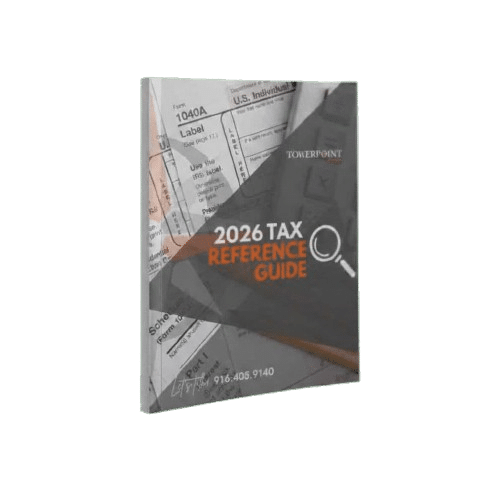Introduction
The 2025 presidential election has brought Donald Trump back into the Oval Office, triggering a new wave of questions from investors. What to invest in now that Trump won? Which sectors will thrive during the second Trump presidency? How will Trump’s tariffs and tax policies reshape the financial markets?
With the Trump administration already advancing a bold economic agenda, the implications for your portfolio are real and immediate. But rather than react emotionally to election outcomes, successful investors lean on data, planning, and long-term perspective.
At Towerpoint Wealth, we help our clients align their wealth strategies with both macroeconomic trends and personal financial goals. In this guide, we explore how the Trump presidency is likely to affect the stock market, which investments carry the most opportunity, and the most risk, and how to prepare for the next four years of political, economic, and market developments.
The Trump Administration’s Economic Vision

A Return to Deregulation and National Priorities
The Trump administration’s policy foundation remains rooted in pro-business deregulation, tax cuts, and trade protectionism. A priority agenda for the White House includes reviving American manufacturing jobs, loosening regulatory oversight, reducing borrowing costs through pressure on the Federal Reserve, and renegotiating international trade agreements.
This mix is designed to fuel growth and protect U.S. industries. However, it also carries risk, particularly when it comes to inflationary pressures and geopolitical uncertainty.
Trump’s Tariffs: New and Expanded
Trump’s proposed tariff expansion in 2025 includes a 10% baseline tariff on all imports, with targeted levies of up to 60% on goods from specific countries like China. These tariffs are expected to impact hundreds of billions of dollars in global trade. While they aim to support U.S. companies and jobs, they could also increase costs for consumers and raise the potential for retaliation.
The Federal Reserve and Rate Cuts
While the Federal Reserve operates independently, Trump has again expressed support for rate cuts to support economic growth. The interplay between White House policy and Fed decisions could affect borrowing costs and broader market stability, especially if inflation continues to rise.
Stock Market Outlook Under Trump
Market Response to Trump’s Election
The stock market reacted favorably in the days following Trump’s election. The Dow Jones Industrial Average and S&P 500 saw modest gains, driven by optimism around deregulation, defense spending, and energy development. Equity markets have begun to favor value-oriented sectors such as financials, industrials, and energy, while technology continues to lead selectively.
Financial Markets and Volatility
Despite the early market rise, many analysts expect the financial markets to be highly volatile in the next two years. Trade policy shifts, geopolitical developments involving China and Taiwan, and persistent inflation could create instability. Investors must be prepared for rapid sector rotation and policy-driven market swings.
Top Investment Opportunities in 2025

1. Nuclear Energy and Utilities
The Trump administration is aggressively supporting nuclear development to power America’s data-hungry industries. Companies like Oklo, and traditional utility providers investing in next-generation nuclear solutions, are expected to benefit.
The rise in energy demand, driven by AI data centers and manufacturing expansion, will continue to boost utility companies with strong infrastructure and clean-energy portfolios. This sector offers a rare intersection of growth potential and defensive characteristics.
2. Financials and Mid-Cap Banks
Deregulation is a central pillar of the Trump presidency. Financial institutions, particularly regional and mid-cap banks, stand to benefit from looser oversight and increased lending activity. Investors should look for financial stocks with strong fundamentals and exposure to business credit markets.
The Free Markets ETF (FMKT.P), launched to capitalize on deregulation themes, provides targeted exposure to financials, deregulated energy, and alternative assets like Bitcoin operations.
3. Defense and Aerospace
With the White House prioritizing national security and military development, defense companies are well-positioned. Increased federal spending on cybersecurity, aerospace, and military operations will create opportunities for defense contractors and advanced manufacturing firms.
In particular, companies with deep Department of Defense relationships and U.S.-based manufacturing operations are likely to outperform.
4. Gold and Precious Metals
Gold is regaining favor among institutional investors. In 2025, elevated borrowing costs and a volatile rate outlook have made long-term Treasuries less attractive, driving interest in gold as an inflation hedge and store of value.
Gold-related investments carry potential portfolio stability, especially in an environment where inflation and trade tensions remain unresolved.
5. Semiconductors and Strategic Technology
Despite tariffs and tech scrutiny, technology remains a long-term growth engine, particularly hardware and semiconductor firms that are part of the national interest. The Taiwan Semiconductor Manufacturing Company (TSMC), a key supplier to U.S. chip makers, is strategically important amid China-U.S. tensions.
Investors may consider direct exposure to TSMC or U.S. firms investing in domestic semiconductor capacity. Technology firms focused on infrastructure, cybersecurity, and manufacturing automation offer more durable growth.
6. Infrastructure and Industrial Growth
Tax incentives and Trump’s “America First” manufacturing agenda will likely benefit industrial firms involved in domestic infrastructure development. This includes construction equipment, transport logistics, and industrial automation.
Capital expenditures are expected to rise across sectors, offering equity opportunities in companies that lead in reshoring and modernization.
7. Select Renewable Energy Investments
Despite reduced federal support, renewable energy is not going away. Private investment continues to flow into solar, wind, and battery storage. AI-driven energy demand and long-term decarbonization goals still support well-capitalized renewable energy companies.
This sector may require selective investing but still holds promise for forward-looking portfolios.
Sectors to Approach With Caution

Consumer Discretionary and Global Trade Exposure
Sectors that rely on global supply chains or foreign consumer markets may be vulnerable under Trump’s tariffs. Retailers, international manufacturers, and logistics companies could face margin pressure from rising import costs and trade barriers.
International Equity and Emerging Markets
While international diversification remains valuable, investors should be cautious with countries that may be affected by U.S. tariffs or retaliatory measures. Trade-focused economies may experience slower growth or investment capital flight.
High-Growth Tech With High Valuations
Overvalued tech stocks with weak cash flow or speculative business models are particularly exposed in a market with rising rates and higher inflation. Investors should prioritize technology companies with clear profitability, resilient operations, and ties to critical infrastructure or national security.
Tactical Allocation and Investment Strategy

Asset Allocation for the Trump Economy
A well-constructed portfolio during the Trump presidency should emphasize:
- Overweight: Financials, defense, nuclear energy, strategic tech
- Neutral: Large-cap growth, healthcare, diversified infrastructure
- Underweight: Consumer discretionary, global retail, speculative tech
Diversification remains critical. Tactical tilts should reflect policy-driven sectors while maintaining risk-adjusted balance.
Managing Inflationary Pressures and Volatility
With inflation likely to persist, consider the following adjustments:
- Add: Gold, short-duration bonds, inflation-protected securities (TIPS)
- Reduce: Long-duration fixed income, unprofitable tech
- Explore: Alternative yield strategies and defensive equity income plays
Tactical risk management also includes reevaluating your emergency cash allocation and ensuring your investments align with your risk tolerance.
Tax Advice and Wealth Planning
The Trump administration is expected to revisit estate tax thresholds and corporate tax policy. Investors should seek proactive tax advice to manage capital gains, estate exposure, and income distribution. Charitable giving strategies and trust planning may also be affected over the next four years.
Towerpoint Wealth works closely with clients to optimize after-tax returns and implement legal strategies to protect multi-generational wealth.
The Role of a Fiduciary in a Politically Volatile Market
Election outcomes and policy changes will always create waves in the financial markets, but long-term success stems from clarity, consistency, and fiduciary guidance.
A second Trump presidency introduces both opportunity and uncertainty. Whether you’re evaluating specific stocks or rebalancing your overall portfolio, Towerpoint Wealth helps clients apply disciplined investment principles, grounded in research, not rhetoric.
We integrate personal goals, cash flow needs, tax efficiency, and market trends into a comprehensive strategy, so your money works as hard as you do, no matter who’s in office.
Frequently Asked What to Invest in Now That Trump Won Questions
What Are The Best Investments Now That Trump Won?
Strong opportunities exist in nuclear energy, financials, defense, and strategic technology like semiconductors. Gold also offers a solid hedge. However, investments carry risk and should align with your long-term goals.
How Will Trump’s Tariffs Impact The Stock Market?
Trump’s tariffs could raise input costs, impact trade-dependent companies, and introduce inflationary pressures. However, they may also benefit U.S. manufacturers. The broader market will likely respond with volatility, sector rotation, and pricing power dynamics.
Should I Change My Investment Strategy After The Election?
You may need to make tactical shifts, but not overhaul your plan. A disciplined, goals-based investment strategy will outperform emotionally driven adjustments. Consult a fiduciary advisor for personalized guidance.
What’s The Outlook For Technology Stocks Under Trump?
Selective tech remains strong, particularly semiconductors and infrastructure-focused firms. Companies like Taiwan Semiconductor Manufacturing Company may face geopolitical uncertainty but are too strategically important to ignore.
How Should I Respond To Geopolitical Uncertainty Under The Trump Administration?
Ensure global diversification is paired with quality exposure. Monitor developments in Taiwan, China, and Europe. Consider holding cash or low-volatility investments as buffers against international risk.
Conclusion
Trump’s election has once again reshaped the conversation around investing. His administration’s focus on tariffs, deregulation, tax cuts, and industrial policy will create both winners and losers across the market.
As investors, the challenge isn’t predicting every move, it’s preparing with purpose. From financial markets to manufacturing, from energy policy to tax advice, the next four years will be shaped by political agendas and economic realities.
Now is the time to revisit your investment strategy, rebalance risk, and protect your wealth.







